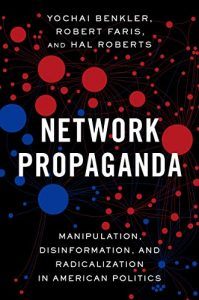Deborah Chasman in the Boston Review:
 Deborah Chasman: The book focuses on the 2016 election and what made the public sphere so vulnerable to what you call “disinformation, propaganda, and just sheer bullshit.” You resist the idea that technology was the primary driver of that problem, that the manipulation of Facebook’s platform, the Russian intervention, and fake news led to a Trump victory. What did you find in your research that led you to challenge the now common story that extreme polarization has been technologically driven?
Deborah Chasman: The book focuses on the 2016 election and what made the public sphere so vulnerable to what you call “disinformation, propaganda, and just sheer bullshit.” You resist the idea that technology was the primary driver of that problem, that the manipulation of Facebook’s platform, the Russian intervention, and fake news led to a Trump victory. What did you find in your research that led you to challenge the now common story that extreme polarization has been technologically driven?
Yochai Benkler: What really shaped our interpretation was the data. We analyzed just under four million stories online about the election or national politics, published between April of 2015 and the one year anniversary of the Trump presidency, using Media Cloud, a media ecosystem analysis system that we at Harvard’s Berkman Klein Center have been developing with our colleagues at MIT’s Center for Civic Media for a decade. We analyzed how these stories linked to each other—that is, how media producers cited one another as authority or sources, and combined these with text analysis to understand what these stories were talking about and when. These gave us insight into the supply side of political news in the United States. We also analyzed how these stories were tweeted and shared on Facebook, from which we inferred audience attention patterns; and both on the supply and demand sides, we performed network analysis to map the architecture of authority and attention in the U.S. media ecosystem. To these we added detailed case studies of particular controversies, such as how the Clinton emails or Clinton Foundation were covered, or how the Trump Russia investigation was covered during 2017. For these case studies we added text analysis of television coverage to our analysis of online communications.
The data was not what we expected.
More here.
